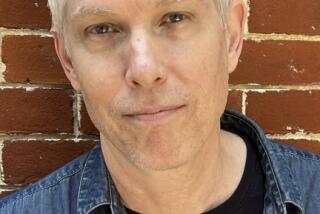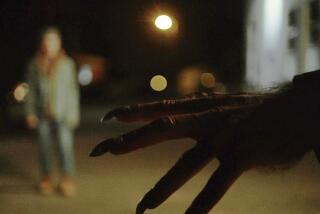Book review: ‘The Last Werewolf’ by Glen Duncan
If you’ve had your fill of dreamy teen vampires, then Glen Duncan’s new novel, “The Last Werewolf,” will give you a reason, in the immortal words of Ozzy Osbourne, to bark at the moon.
The serious literary crowd can’t bring itself to take any of the genre stuff seriously: Tales of werewolves, vampires and other fantastic creatures are just too low-brow for them. (Time’s better spent reading another novel of middle-class family dysfunction, I guess.) But Duncan’s book offers those deeper, reflective surfaces that they might crave: No one broods on history and irony more than his narrator, Jacob Marlowe, even if his meditations get interrupted every 30 days or so by an absolute hunger for flesh.
As the title informs us, Jacob is the last of his kind. The bite of a werewolf usually turns victims — if they survive the attack, that is — into wolves themselves. But in the last century, the bite, and whatever lycanthropic virus it delivers, just hasn’t taken. This, along with the constant pursuit of hunters from the World Organization for the Control of Occult Phenomena, has caused wolfling numbers to plunge harder than the recent stock market. Now there is only one, 200-year-old Jacob.
Duncan’s novel is a performance — crude, eloquent, elegant, obscene, darkly humorous (fill in your choice of adjective here) — that tells the story of this troubled wolfman facing an existential crisis as hunters track him across the United Kingdom.
Two centuries of living have made him extremely world weary.
“I’m immune to news,” he declares, lighting up a Camel and watching snow fall in the London streets. “The news, breaking news, rolling news, news flashes. Live long enough and nothing is news…. A hundred years go by and you realise there are no new things, only deep structures and cycles that repeat themselves through different period details.”
What else doesn’t change? One’s past sins. One’s feelings of remorse. Memory. Jacob broods on his origins and his first kill in these pages, on the old life he left behind when he collided with — and was mauled by — a werewolf fleeing hunters in a Welsh forest in the 19th century.
At first, he thought this happened as a punishment from God. Why? Because of the perfect love he shared with his wife, Arabella. Their love, he says, left no room for anyone else “and God shrank in the light of our divinity.” Over the course of two centuries, and a pile of victims — about 1,000 per century — he changes his mind. There is no God to give his cursed self any meaning, or to applaud his philanthropic efforts to compensate for the destruction he has caused.
There is meaning, however, in being hunted. WOCOP’s Eric Grainer, the maestro of all wolf killers, is on Jacob’s trail — so are a group of vampires and a sexy heiress with deep ties to the occult and to military contractors in Iraq. They all want different things from Jacob, but Jacob is tired of living: “I’ve had enough … it’s time to go,” he says many times. “I really can’t stand it anymore.” He’s perfectly willing to give up to Grainer without a fight (which is not what the maestro wants, leading to some very cruel business). But Jacob is swept up by so many other plots — one of these involves an ancient book said to explain the origins of werewolves — that he can’t get back to the simple business of dying. Best-laid plans of wolf and man….
Duncan’s prose is muscular and breathtaking. The air isn’t just cold, it’s “snow-flavoured”; beyond the erotic “bliss of the Fallen flesh,” he discovers “a Fall further, into the bliss of devouring it”; and his descriptions of the Change, from man to wolf, are lyrical and scientific all at once: “My shoulders shifted, not without difficulty learned the strange game of osteomorphosis, bore the hurried tectonics, the sensation of turning to ice and the shocking thaw that left a new grammar of movement.… My lupine twin was impatient.”
In his other novels — including “I, Lucifer” and “The Bloodstone Papers,” which have earned him the praise of the Times Literary Supplement — Duncan takes on complicated, often bizarre story lines and brings together unlikely subjects. Here, in “The Last Werewolf,” it’s no different as he joins cultural commentary, a supernatural thriller and, even, a bit of a love story (stories, actually) and a friendship narrative into a single compelling tale.
When you finish reading this novel, you’re going to feel full. But it’s a good feeling of fullness, just as Jacob feels after one of his moonlight rampages. “You ingest a life,” he tells us, “trust me, it fills you.”
More to Read
Sign up for our Book Club newsletter
Get the latest news, events and more from the Los Angeles Times Book Club, and help us get L.A. reading and talking.
You may occasionally receive promotional content from the Los Angeles Times.






